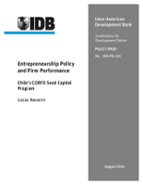Entrepreneurship Policy and Firm Performance: Chile's CORFO Seed Capital Program
Date
Aug 2014
This paper uses administrative data from projects for which an application was made to CORFO's (Chile's main development agency) Seed Capital Program (SCP) during the 2008-12 period. This paper analyzes the impact of the program, which is a subsidy provided to new, innovative firms, on Start, Growth, and Survival. The projects are supported by sponsors in the application process. Results of our analysis indicate that, controlling for observed characteristics, projects that received the subsidy had a 9.5 percentage point higher probability of starting to sell. Among created firms, subsidized (Treated) firms showed a 17 percentage point higher probability of significant Growth (in sales) and a similar effect on Survival. The analysis also examined a change in the program rules in 2011, whereby sponsors were paid based on performance instead of fixed fees, as it was before 2011. For projects affected by the policy change, results indicate no overall association of the program with the probability of Start and a positive correlation with Growth and Survival. These results could be a consequence of sponsors making better project selections for funding. The change in rules means that the program contributes more to the Growth and Survival of new firms than to their Start, which would take place anyway. The data available for this study did not make it possible to control for potential selection biases, and thus the results need to be viewed with caution, and data collection standards need to improve to help identify the true effect of this type of program.



